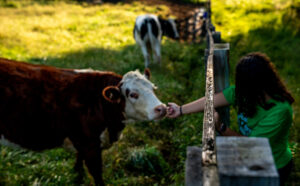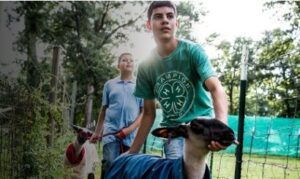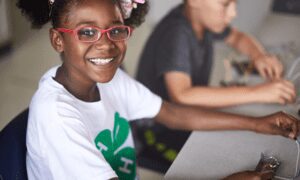In memory of Elizabeth Weidner (2004-2021). Her adventurous spirit will live on and inspire us, forever.
September is Childhood Cancer Awareness Month, signified by the gold ribbon because children are as precious as gold. Cancer doesn’t discriminate; it can happen to and affect any child. This includes our 4-H families. It happened to ours!
My journey hasn’t been easy, but one way I stayed focused was my involvement with 4-H. During my bone marrow transplant for example, I was isolated in a children’s hospital in St. Louis where the occupational and physical therapists wanted me to play games or do Legos because “that’s what people usually do when recovering from transplant.” Instead I worked on 4-H projects. Those projects kept me focused, brought me comfort, and gave me a purpose!
4-H groups can serve their own purpose while helping families in their communities who may be affected by cancer. Here are some ways you can bring help and provide assistance to those families in need.
Provide Basic Supplies: Partner with local hotels or civic clubs to collect and donate sample-sized toiletries and items to children’s hospitals or local Ronald McDonald Houses. Emergency trips happen, items get forgotten, and budgets are tight. From experience, these samples make a big difference.
Organize Blood Drives: Cancer patients go through a lot of blood products due to the toxicity of treatment on the individual. Blood banks continue to experience critical shortages that affect the ability to supply hospitals and cancer center needs. Organizing a blood drive can’t offer 4-H members so many leadership opportunities that people don’t think about, like organizational skills. Saving lives is meaningful.
Support Siblings: As a patient, I can tell you siblings are often left out of the equation. Cancer affects the entire family. Maybe your club could offer to adopt or do something nice for a cancer warrior’s siblings. My brothers are into sports, so many have purchased athletic shoes or paid for uniforms, which is really helpful. Carpooling, showing up to events and cheering for them, and streaming games are a few other ideas that show siblings that someone cares.
Give Your Time through 4-H Projects: Something that doesn’t require money is the gift of time, especially if that time spent dedicated to a 4-H project or interest! Here are a few examples:
- Do you have a talent such as photography? When budgets are tight or time is limited, professional family portraits are often neglected. Your 4-H photography project could give a cancer-family precious memories for the future.
- Maybe you belong to a spin club that focuses on animals. My siblings love to go horseback riding but we don’t own horses. So a couple of local 4-H families donate their time to teach my brothers how to ride. That special time takes their minds off of missing our parents or thinking about what is happening in the hospital. Those experiences put smiles on faces where tears often reside!
- Do you have members who want to learn how to sew? Try a Saturday service project learning the basics and creating pillowcases for children’s hospitals. Cotton fabrics work best, especially on oncology floors where linens are changed daily. A pillowcase, while it may seem simple, brightens sterile hospital rooms stitched in love.
Develop a Meal Train: A meal train is an organized meal giving system that allows you to donate a meal or request a meal delivery. Some families need daily help while others may choose specific dates that align with appointments. For my mom, preparing a meal some days may be the last thing on her mind. Coming home to a home cooked meal, especially one that includes tried and true 4-H recipes brings true comfort to our family!
It’s easy to get overwhelmed at any age when you hear the words, “You have cancer,” but where we find hope is our community. Whether a community means where you reside, where you practice your faith, your 4-H family, or another group you belong to, it’s where we find our strength, how we move forward, and ultimately, what makes us survivors.
















